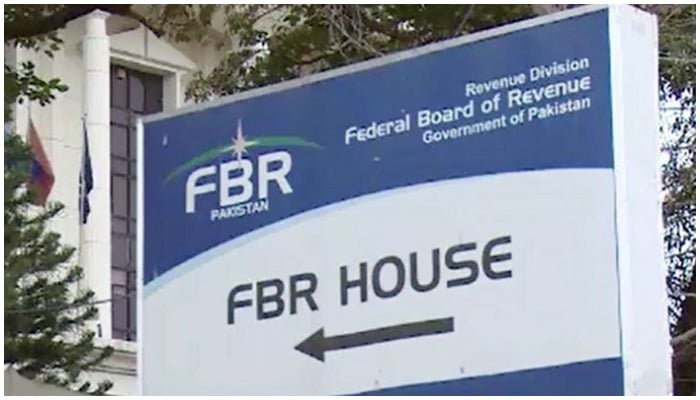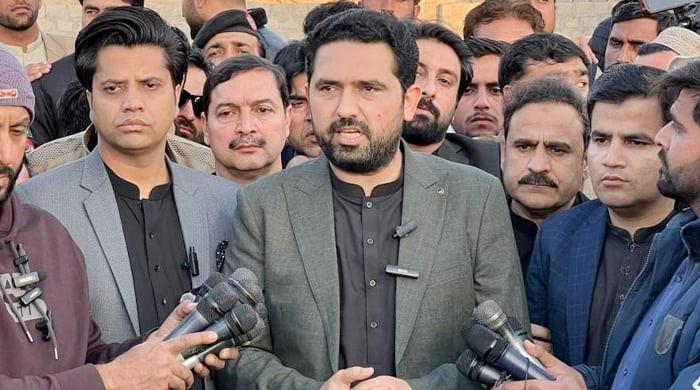Finance Bill 2021-22 suggests granting sweeping powers to FBR for arrests
The proposed legal change would allow the arrest of people concealing income on basis of doubt by tax officers
June 16, 2021

- Per the bill, only requirement for arresting a taxpayer is that the officer effecting the arrest ‘believes’ that the taxpayer has committed an offence that can be prosecuted under the law.
- The Senate Standing Committee on Finance rejects the proposed powers of the FBR officers for arresting and prosecution of taxpayers on suspicion of concealment of income.
- Opposition members term the proposed powers of the FBR officers as ‘draconian’ and made it clear that they would not grant approval in the Parliament.
ISLAMABAD: The Finance Bill 2021-22 has suggested granting some "fundamental and sweeping powers" to the Federal Board of Revenue (FBR) to make arrests and prosecute taxpayers over concealment of income, The News reported Wednesday.
According to the proposed changes, all officers of Inland Revenue (IR), starting from the Assistant Commissioner, could arrest a taxpayer accused of a tax offence without even filing a complaint before a special judge.
Thus, a concept of pre-trial arrest and detention is being introduced to the income tax law for the first time. The only requirement for arresting a taxpayer is that the officer effecting the arrest ‘believes’ that the taxpayer has committed an offence that can be prosecuted under the law. Even the prior filing of a complaint before the special judge will not be required.
However, the Senate Standing Committee on Finance has rejected the proposed powers of the FBR officers for arresting and prosecution of taxpayers on suspicion of concealment of income. The Opposition members termed the proposed powers of the FBR officers as ‘draconian’ and made it clear that they would not grant approval in the Parliament.
The question arises why the FBR proposed more sweeping powers when the Income Tax Ordinance (ITO) 2001 already has provisions for prosecution.
Tax experts say that the Income Tax Ordinance 2001 includes a complete chapter containing provisions for the prosecution of a wide range of offences ranging from the concealment of income to non-filing of returns and statements.
Punishments for these offences include imprisonment for periods extending from one year to seven years and fines up to Rs5 million. These punishments are in addition to any other liability imposed on the defaulter under the ordinance, including the recovery of the evaded tax, imposition of penalty, and default surcharge.
The procedure required for prosecuting and awarding punishment to the defaulter includes filing a case before a special judge appointed by the federal government. Only a person, who is or has been a sessions judge, can be appointed a special judge for the purposes of trying income tax offences.
The Commissioner of Income Tax can file a complaint before the special judge who will conduct the proceedings under the Code of Criminal Procedure 1898. Appeal against the order of the special judge lies with the High Court. The defaulter can be arrested and imprisoned only after completion of the trial by the special judge resulting in the award of punishment.
Now the Finance Bill 2021 proposes to make some fundamental changes in the procedure explained above and grant sweeping powers to the FBR officers for the arrest and detention of taxpayers.
According to the proposed law, the officer initiating the arrest will intimate the special judge about the arrest and produce the arrested person before the special judge or a judicial magistrate within 24 hours of the arrest and the special judge may order detention for an unspecified period or accept a request for bail.
The special judge, on the request of the arresting officer, may also remand the arrested person in the custody of the arresting officer for a period of 14 days for the purpose of conducting an inquiry. The provision of remand in the custody of the inquiry officer is self-contradictory because the arrest is supposed to be affected if the arresting officer has material evidence in possession that the person being arrested has committed an offence leading to prosecution.
Another provision of the proposed law proving that the powers to arrest will be used without any evidence is that if after arrest and inquiry the officer is of the opinion that there is not sufficient evidence or reasonable ground for suspicion against such person, they shall release then upon the execution of a bond, and shall direct such person to appear if so required, before the special judge and request the special judge for the discharge of such person.
The proposed law totally disregards the normal procedure for assessment of tax under the Income Tax law and attempts to introduce a parallel system of inquiry and determination of liability but fails to specify whether these dual systems will operate independently or one will follow the other.
It has to be kept in mind that a similar system of arrest is available under the Sales Tax and Federal Excise laws as the nature and scheme of these laws are entirely different from Income Tax and such powers can be justified for the administration of these taxes.
But even in the case of sales tax, the courts have not approved these coercive powers without prior quantification and adjudication of the tax liability under the normal procedure. However, while attempting to acquire similar powers under the Income Tax Laws FBR seems to have ignored these judgments of the courts as well.
The explanation of the proposed powers to arrest and detain that are completely alien to the scheme of income tax law as in force for the last 100 years since the promulgation of the Income Tax Act of 1922 is sufficient to show the draconian nature of the proposed law.
There is ample possibility of misuse of these powers to harass the taxpayers leading to corrupt practices. It is not understandable as to why the finance minister who himself has acknowledged and expressed concern over the harassment of taxpayers by the FBR wants to arm the same officers with such oppressive and arbitrary powers that will take harassment to an altogether unprecedented level.
The finance minister intended to use this budget and the finance bill to stimulate economic recovery and growth but giving such crushing powers to the FBR will totally destroy the confidence of businessmen and common taxpayers.
FPCCI slams ‘discretionary’ power of arrest for concealing income
The Federation of Pakistan Chambers of Commerce and Industry (FPCCI) on Tuesday slammed the proposed legal change that would allow the arrest of people concealing income on mere doubt by tax officers.
Speaking during Geo News' programme "Geo Pakistan," President of the FPCCI Naaser Hyatt said that the body had sent proposals to Prime Minister Imran Khan since February 15 to make the tax system uniform for everyone.
With regards to the proposed changes, he said that first accusations are levelled against someone, followed by an inquiry to find evidence.
"These are the demands to ensure justice. Going and arresting someone directly is not the way to go about it," he said.
He also said that the new proposed bill suggests imposing some conditions on importing items from abroad, adding that such conditions are not imposed anywhere in the world.
"There is a condition that containers coming from abroad must have an invoice and violation will lead to fines worth Rs100,000 for the first time, Rs200,000 for the second time or the confiscation of items."
Earlier, Hyatt had issued a statement on behalf of the FPCCI saying that income tax is a civil liability and could not be treated as criminal liability.
“This has always remained a civil matter historically.”
Naaser said section 203A will add to the already existing harassment of businessmen by tax officials through the issuance of several thousand notices. Finance Minister Shaukat Tarin’s timely intervention has resulted in the withdrawal of a big number of notices issued to the businessmen.
FPCCI president said businessmen must be respected for generating taxes and employment for the country. The business should be conducted in harmony instead of in conflicts and contradictions created by the tax officials and their discretionary powers.
“Section 192A (Prosecution for Concealment of Income) of the Income Tax Ordinance, 2001, already covers the subject sufficiently. There is no need for Section 203A and FPCCI demands it should be omitted and taken off the table in the final budget documents,” he said. "The FPCCI is looking forward to resolving this issue by the withdrawal of Section 203A on an immediate basis."











